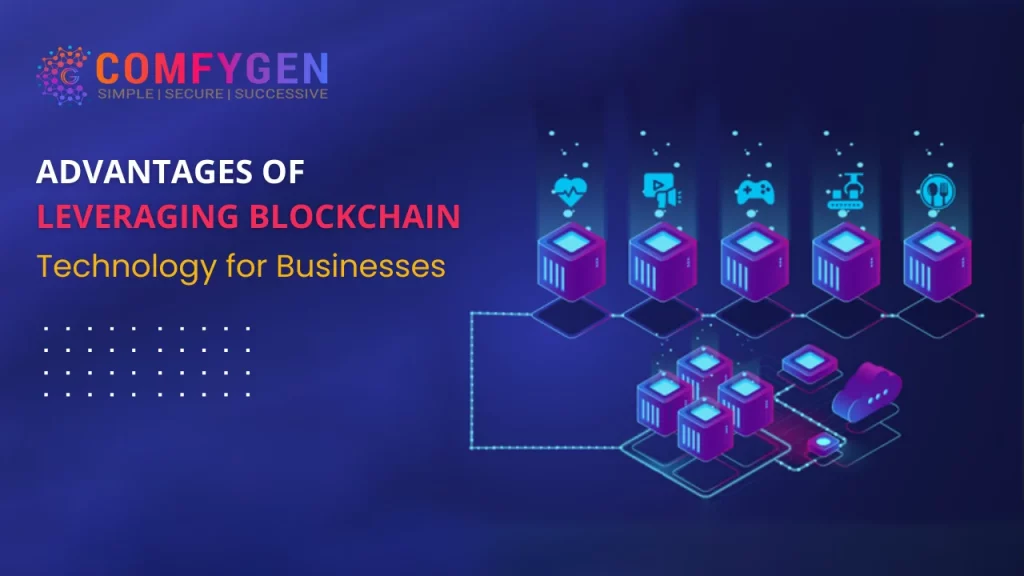
Smart Contracts and Blockchain form a powerful alliance revolutionizing business mobile development operations. Blockchain development decentralized and secure nature ensures translucency and invariability, while Smart Contracts automate and apply agreements without interposers. This collaboration streamlines blockchain development processes, reduces costs, and mitigates pitfalls. Inflexible records enhance trust, making it ideal for blockchain development agency diligence like finance blockchain development, force chain blockchain development, and healthcare blockchain development. Through tamper- resistant deals and automated compliance, this brace enhances effectiveness and fosters invention. The alliance of Smart Contracts development and Blockchain Development is reshaping blockchain development diligence, offering a strong foundation for the future of secure and flawless business operations.
Blockchain development technology is a decentralized digital ledger that enables safe and open transaction recording. It functions by arranging information into a series of blocks that are difficult to change. Each block has a distinct code (hash), which when connected to the preceding block in the chain, results in an impenetrable chain. Blockchain development services is often associated with cryptocurrencies development like Bitcoin development since it enables the recording and tracking of digital currency transactions without the need for a central authority. The supply chain, voting processes, and digital identity verification are just a few of the numerous possible uses of blockchain app development technology that go beyond cryptocurrency development company.
Blockchain technology development is a very secure way to store and transfer data because of its decentralized structure, which makes it immune to hackers and tampering. Additionally, because everyone participating in a transaction may see the same information, blockchain development services promotes better accountability and openness.
The aim of the blog “Smart Contracts and Blockchain: A Powerful Combination for Business Applications” is to explain the dependent impact of integrating smart contracts development services with blockchain app development technology in the blockchain application development business field . It seeks to provide insights into the transformative potential of this combination, emphasizing its role in enhancing efficiency, security, and transparency. The aim is to skills readers with a whole understanding of how leverage smart contracts development within a blockchain application development framework can revolutionize various blockchain development agency, encourage innovation and reshaping the landscape of contemporary business mobile applications development services.
Introduction Blockchain Development and Smart Contract Development

Blockchain development and Smart Contract development have appear In the ever-evolving digital landscape as transformative forces. Blockchain app development ensures a decentralized ledger, transparency and security, while Smart Contract development services automate agreements, minimizing reliance on intermediaries. This dynamic pair is reshaping how we conduct transactions and agreements, offering efficiency, security, and trust.
Evolution of Contracts in the Digital Era
Traditional smart contracts development have evolved with blockchain development technology, adapting to the digital era. Blockchain development and Smart Contracts development with the coming development has taken a leap forward. Digital smart contracts now go beyond physical boundaries that offering efficiency, traceability, and security previously unreachable in the analog world.
Deciphering Blockchain: A Primer
Blockchain development is a distributed and hyperledger blockchain development. that operates on a consensus mechanism, ensuring trust among blockchain development participants. Every block in the blockchain contains a cryptographic hash of the previous block that creating an unchangeable record. This tamper-resistant blockchain development technology fosters transparency, security, and accountability, making it the backbone of various blockchain development agencies.
>>> Read More: A Comprehensive Guide from a Leading Hyperledger Blockchain Development Company
Smart Contracts: The Future of Automated Agreements
Smart Contracts development services are self-executing accord with the expression of the smart contract directly written into code. Activate by predefined conditions, these smart contracts automate blockchain development processes without the need for intermediaries. The potential mobile applications development services are extensive that from financial transactions to supply chain management, offering efficiency, accuracy, and cost-effectiveness. As blockchain technology development advances, Smart Contracts development are poised to become the basis of automated, secure business agreements.
Glance Here: An Insider’s Guide to Blockchain App Development
Importance of Blockchain and Smart Contracts in Today’s Economy
Blockchain development services and Smart Contracts development services play central roles in the contemporary profitable economy landscape and reshaping the way deals be and agreements are executed. Blockchain development decentralized nature ensures security, invariability, and translucency, addressing trust issues current in traditional systems. Smart Contracts development, on the other hand, automate blockchain development processes, reducing belief on interposers and enhancing effectiveness. This dynamic brace is getting decreasingly necessary that offering a strong foundation for a more secure, effective, and transparent economy.
Redefining Trust and Transparency through Technology:
Blockchain technology with its decentralized and distributed ledger, is reconsidering the veritably substance of trust and translucency. By eliminating the need for a central authority, it fosters a system where blockchain development actors can trust the integrity of deals. Every sale is recorded in a secure, tamper- resistant manner that enhancing translucency and reducing the eventuality for fraud. This blockchain technological shift instills confidence in profitable relations, laying the root for a further secure and responsible business terrain.
The Economic Impact of Smart Contracts Development:
Smart Contracts development are catalysts for profitable metamorphosis, revolutionizing the way agreements are executed. By automating contractual blockchain development processes, Smart Contracts development reduce costs associated with interposers, streamline workflows, and minimize the threat of crimes. This not only enhances effectiveness but also opens avenues for new business models. The profitable impact is profound because Smart Contracts development services surface the way for faster, more secure deals, eventually contributing to a more nimble and competitive frugality.
Understanding the collaboration Between Smart Contracts and Blockchain Technology

The collaboration between Smart Contracts and Blockchain technology is a transformative force in the digital landscape. Blockchain app development decentralized, distributed ledger establishes a foundation of trust, security, and translucency. Smart Contract development, bedded within this blockchain, automate and execute agreements grounded on predefined conditions. Together, they produce a flawless, tamper- resistant system, reconsidering the way deals and smart contracts are handled. This cooperative cooperation enhances effectiveness, reduces costs, and introduces a new position of trustability to colorful blockchain development diligence.
The Integral Relationship of Smart Contracts with Blockchain:
The relationship between Smart Contracts development and Blockchain development is collective. Smart Contracts development work the decentralized and transparent nature of Blockchain development to execute deals seprate. Blockchain development services, in turn, benefits from the robotization and tone- executing capabilities of Smart Contracts development. The interdependence of these blockchain development technologies forms a symmetric ecosystem that ensures the integrity and effectiveness of digital agreements, setting the stage for a decentralized and trust- enhanced pattern in the decentralized finance apps field, force chain, and beyond.
Mutual Reinforcement: How Blockchain and Smart Contracts Create Value Together:
Blockchain development and Smart Contracts development mutually fortify each other, creating unequaled value in the digital field. Blockchain development distributed tally ensures data integrity and invariability, while Smart Contracts development automate blockchain development processes, reducing belief on interposers. This collective underpinning results in enhanced security, translucency, and effectiveness. Blockchain development diligence espousing this combination experience streamlined operations, reduced costs, and minimized pitfalls. As these blockchain technologies continue to evolve together, they form a important association that reshapes the geography of digital deals and contractual agreements.
Get Free Smart Contracts Cost/Price
Real-World Applications: Implementing Smart Contracts in Blockchain Systems

Smart Contracts in the real-world mobile application of blockchain development technology stand out a game-changer. These self-executing contracts, deployed on blockchain app development platforms, find diverse mobile application development services across blockchain development industries. Smart Contracts development automate and enforce agreements, ensuring efficiency, transparency, and security From finance blockchain development and healthcare blockchain development to supply chain blockchain development and real estate blockchain development. These mobile application development services revolutionize traditional blockchain development processes, providing a glance into the transformative potential of combining Smart Contracts development with blockchain development systems.
Case Studies of Smart Contracts in Various Industries:
Numerous case studies showcase the versatility and impact of Smart Contracts blockchain development across blockchain development industries. Smart Contracts in finance facilitate seamless and secure transactions which reducing settlement times. Healthcare blockchain development leverages them for transparent and automated patient data management. Supply chain logistics benefit from Smart Contracts by enhancing traceability and reducing fraud. Real estate transactions become more streamlined and secure through automated property transfers. These case studies underscore how Smart Contracts, embedded in blockchain development systems, address blockchain development industry-specific challenges, operate efficiency and innovation.
Read More: The Ultimate Guide for Real-World Asset Tokenization on Blockchain Development
Streamlining Operations with Smart Contracts:
The implementation of Smart Contracts goes beyond theoretical benefits that directly impacting day-to-day operations. Smart Contracts by automating contract execution reduce the need for manual intervention, leading to faster and error-free blockchain development processes. Smart Contract in supply chain management for example facilitate automatic payment upon successful delivery, minimizing delays and disputes. The efficiency gains extend to diverse sectors that demonstrating how streamlined operations translate to cost savings, improved accuracy, and enhanced overall productivity. As Smart Contracts blockchain development continue to evolve, their role in operational optimization becomes increasingly indispensable across various domains.
Our Portfolio
Leading Blockchain Platforms for Smart Contract Deployment

Smart contracts deployment has become a basis of blockchain development technology and many blockchain development platforms have come out a leaders in this space. These blockchain development platforms offer the infrastructure and capabilities necessary for hire Ethereum Developers from India to create, deploy, and execute smart contracts seamlessly. These Leading blockchain development platforms by an environment of trust, transparency, and automation contribute significantly to the evolution of decentralized mobile applications and business leading blockchain development processes.
Ethereum: The Leading Name in Smart Contracts:
Ethereum blockchain development stands out the pathfinder in smart contract deployment. Its blockchain development platform provides a strong framework for DApp development through smart contracts. Ethereum blockchain development Turing-complete programming language, Solidity, enables ethereum blockchain development developers to implement intricate smart contracts that making it a go-to choice for different blockcain development industries. The Ethereum blockchain development network’s extensive adoption and active ethereum blockchain development developer community further harden its position a trailblazer in the smart contract development technology field.
>>> Read More: Ethereum Blockchain-based Computing Platform for DApps
Alternatives to Ethereum: A Look at Other Key Players:
Alternative blockchain developent platforms have gained prominence while Ethereum blockchain development leads the pack every offering unique features and capabilities. Blockchain development platforms like Binance Smart Chain blockchain development, Polkadot blockchain development, and Cardano blockchain development present viable alternatives with different consensus mechanisms, scalability blockchain development solutions, and governance structures. These alternative blockchian development platforms aim to address some of the scalability challenges faced by Ethereum that providing blockchain developers and businesses with a different category of options for smart contract deployment based on specific ethereum blockchain development project requirements.
>>> Read More: How to Build an Ethereum Smart Contract in 7 Easy Steps
Comparison of Blockchain Platforms Based on Smart Contract Capabilities:
When asses blockchain development platforms for smart contract deployment, factors like scalability, transaction speed, security, and developer-friendly features become important. Ethereum blockchain development’s strongest in supporting complex smart contracts is often compared with the efficiency and low transaction costs of Binance Smart Chain blockchain development . Meanwhile, newer entrants like Polkadot blockchain development focus on interoperability and scalability. A thorough comparison of these blockchain development platforms allows blockchain developers and businesses to choose the most suitable option based on their unique needs, contributing to the ongoing evolution of smart contract blockchain development technology.
Read More: Creating Your Own DApp with Ethereum Smart Contract Development: A Step-by-Step Guide!
The Proliferation of Smart Contracts: Numbers and Implications

The extensive adoption of smart contracts has reshaped the digital landscape that transforming the way agreements are executed. As businesses and blockhcain development industries increasingly recognize the benefits of automation and security offered by smart contracts, the numbers associated with their increase release a pattern shift in how transactions and contracts are conducted. This rush in adoption not only highlights the efficiency gains but also signifies the growing trust in this blockchain technology’s ability to revolutionize various sectors.
Statistical Overview of Smart Contract Adoption:
A statistical overview of smart contract adoption underscores the blockchain technology’s rising significance. Metrics like the number of smart contracts deployed, transaction volumes, and active users on blockchain development platforms provide visible evidence of their increasing use. Blockchain development platforms like Ethereum boast millions of deployed smart contracts, with daily transaction volumes reaching substantial figures. These statistics illuminate the visible impact smart contracts have on real-world mobile applications development services that showcasing their relevance and acceptance across diverse blockchian development industries.
>>> Read More: How to Choose a Blockchain Platform for your Business
Analyzing the Trends: What the Figures Say About the Future of Smart Contracts:
Analyzing current trends in smart contract adoption unveils valuable insights into the blockchain technology’s future trajectory. The figures suggest a growing reliance on smart contracts for streamlined and automated blockchain development processes across sectors like finance, supply chain, and healthcare. The increasing number of blockchain developers engaging with smart contract blockchain development platforms, along with the expanding use cases, indicates a trajectory towards inclusive integration and innovation. These trends collectively paint a picture of a future where smart contracts become even more integral to digital transactions and contractual agreements, driving efficiency and transparency.
Advantages of Leveraging Blockchain Technology for Businesses

Blockchain development technology Leverage in business provides a strong foundation for enhanced security, transparency, and efficiency. Its decentralized and tamper-resistant ledger reduces fraud risks, while smart contracts automate blockchian development processes that minimizing belief on intermediaries. This collaboration results in cost reductions, streamlined operations, and faster transaction speeds. By encourage trust and accountability, blockchain transforms traditional business blockchain development processes that offering a secure and efficient blockchain development framework for the evolving digital landscape.
Enhancing Efficiency and Security:
Blockchain technology offers businesses a transformative blockchain development solution to enhance operative efficiency and security. its decentralized and distributed ledger transactions are recorded in a tamper-resistant manner that eliminate the risk of unauthorized alterations. This transparency not only reduces fraud but also streamlines blockchain development processes by providing a single that immutable source of truth. Automation facilitated by smart contracts further contributes to efficiency, ensuring seamless execution of agreements without the need for intermediaries.
Cost Reduction and Speed of Transactions:
Blockchain development’s impact on businesses extends to significant cost reduction and increased transaction speed. smart contracts by eliminate intermediaries and automating blockchain development processes through operational costs related to verification, resolution, and paperwork are substantially reduced. the decentralized nature of blockchain reduces the dependency on a central authority, lowering transaction costs. The efficiency gains translate into faster transaction processing times, enabling businesses to operate more graceful and respond quickly to market demands.
Read this guide: Blockchain Development Costs & Features – A Complete Guide
Blockchain Development for Business: Trends and Best Practices

Blockchain development for businesses involves staying on a level of evolving trends and adopting best practices to tackle the blockchain technology’s full potential. Embracing DApp development that integrate permissioned blockchains and implementing consensus mechanisms are current trends. Best practices include strong security protocols, scalability considerations, and a focus on interoperability to ensure perfect integration with existing systems.
Blockchain Software Development for Custom Needs:
blockchain development solutions to custom business requirements is important for success. This involves understanding the unique needs of the organization and software development that aligns with its goals. Custom blockchain development allows for the DApp development, smart contracts, and permissioned ledgers designed specifically to address the challenges and opportunities unique to the blockchain development business.
Insights into Blockchain Development Services:
Blockchain development services surround a category of offerings that include smart contract development, consensus algorithm implementation, and blockchain development design. Experienced blockcahin development teams guide blockchain development businesses through the whole blockchain development process and tools from ideation to deployment. These blockchain development services often include thorough analysis, design, blockchain development, and ongoing support, ensuring a perfect integration of blockchain development solutions into existing blockchain development business frameworks.
Partnering with a Blockchain Development Company for Strategic Advantage:
Collaborating with a blockchain development company provides businesses with a strategic advantage. These specialized blockchain development firms offer expertise in blockchain development technologies that ensure efficient and effective implementation. A strategic blockchain development partnership allows businesses to leverage the knowledge and experience of blockchain developers that navigate regulatory landscapes, and gain a competitive edge through innovative and customize blockchain development solutions.
Read More: Hire Blockchain App Developers – Things to Choose Before Hiring a Blockchain App Developer
Exploring Blockchain Solutions for Diverse Market Needs:
Blockchain development solutions are flexible that provide to diverse market needs across blockchain development industries like finance, healthcare, supply chain, and more. Whether optimizing transparency in supply chain management or enhancing security in financial transactions blockchain development businesses explore blockchain to address specific pain points, improve efficiency, and gain a competitive edge in their respective markets.
The Importance of Blockchain Software Development Services in Crafting Custom Solutions:
Blockchain software development services play a central role in crafting custom blockchain development solutions customize to blockchain development business requirements. These blockchain software development services surround the entire blockchain software development lifecycle, from initial ideation and design to deployment and ongoing support. blockchain development businesses can ensure that blockchain development services perfectly integrate into existing blockchain development processes with a focus on customization, maximizing efficiency, and delivering visible value.
>>> Read More: Blockchain Software Development Guide: All you need to Know
Selecting a Blockchain Development Agency for Enterprise Solutions:
When choose the right blockchain development agency is difficult to implement enterprise blockchain development solutions successfully. expertise, experience, and a proven track record are essential considerations. A reputable blockchain development agency collaborates closely with blockchain development businesses, understanding their unique challenges and goals, to deliver customized blockchain development solutions that operate innovation, efficiency, and long-term success.
The Blockchain Technology Stack: Build Blocks for Smart Contracts

The blockchain development technology stack comprises essential building blocks for smart contracts. These blockchain developments include the consensus mechanism, cryptographic algorithms, and the underlying infrastructure. Understanding this stack is important for blockchain developers creating smart contracts, as it ensures the strength, security, and interoperability of the deployed blockchain development solutions. A complete understanding of the blockchain development technology stack skills blockchain developers to develop and deploy smart contracts effectively within the blockchain development ecosystem.
Conclusion
In conclusion, the integration of smart contracts and blockchain indicates a transformative future for blockchain development businesses. the evolution of these blockchain technologies suggests a trajectory toward even more sophisticated, secure, and versatile mobile applications. As blockchain development businesses continue to adopt blockchain and smart contract solutions, it is important to prepare for a profound transformation in business infrastructure. This evolution promises increased efficiency, transparency, and trust, reshaping traditional models and opening doors to innovative possibilities. Embracing this technological collaboration positions enterprises at the forefront of a dynamic landscape, where the perfect integration of smart contracts with blockchain technology moves them into a future defined by innovation and operational excellence.
We assist corporate executives in understanding the what, why, and how of blockchain as it relates to their enterprise solution and how blockchain can be the ideal fit for their business model. With Comfygen, you can create trustworthy, scalable Blockchain applications that will fulfill your company’s needs while reducing losses and preventing fraud.
Quick Contact Us: Call/WhatsApp: +91 9587867258 Skype: comfygen Private Limited Email: [email protected]


